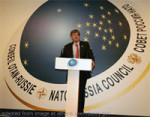Moscow interested in further dialogue with NATO – Federation Council members on NATO-Russia Council meeting

MOSCOW. July 8 (Interfax) – The upcoming NATO summit will hardly be sensational, and a lot will depend on a NATO-Russia Council meeting to take place after it, Federation Council members said, adding that Russia was pro-dialogue.
“Although NATO excitedly speaks about the forthcoming ‘epochal event’, nothing sensationally substantial will happen at the alliance’s summit in Warsaw,” Federation Council International Affairs Committee Chairman Konstantin Kosachyov told Interfax in view of the NATO summit.
The chiefs of state will simply approve an agreement to deploy four battalions to the Baltic republics and Poland, which was reached at a meeting of defense ministers in Brussels back on June 16, and the only question will be their nationality, he said.
Speakers at the summit “will say a lot and express concern about the ‘Russian threat’ in the presence of which they should demonstrate their determination, unity and other courageous qualities,” he said.
“After that they will laud their successful demonstration of those qualities and will say that this fact alone has stopped ‘Russian aggression’ right on the borders of Poland and the Baltic republics,” the parliamentarian said.
“In short, it is easy to predict a summit of loud words and petty deeds. They will once again condemn Russia but will pledge their openness to dialogue. That is, in the event that Russia behaves the way it is told to by NATO. Eastern European countries will be promised protection. Everyone will be asked to chip in and to be more involved in joint actions,” Kosachyov said.
As to the real problems faced by Europe, such as terrorism, the threat of proliferation of weapons of mass destruction and migration, he said NATO simply did not have any answers.
It is highly convenient to speak about ‘Russian threat’ because of that, he said. “Average people are persuaded that terror attacks in European capital cities and millions of migrants are not as important as ‘the enemy at the door’. The louder these slogans become, the clearer it will be that NATO is simply unable to respond to real challenges because it is ‘designed’ to counteract big countries rather than network threats,” Kosachyov said.
In his opinion, the most important thing will not happen during the summit; it will happen afterwards, during the first meeting of the NATO-Russia Council in the past 2.5 years.
“We shall see then how much the alliance is capable of dialogue and accord. In fact, a lot will depend on that. Brussels unilaterally curbed cooperation in a variety of major areas. If they understand that those steps were wrong and taken in the heat of the Ukraine situation and if they demonstrate their readiness to resume [cooperation], the entire Warsaw chatter will not matter,” Kosachyov said.
In turn, Federation Council Defense and Security Committee Chairman Viktor Ozerov said that, judging by materials of the NATO Parliamentary Assembly meeting held in Albania in late May, “NATO parliamentarians feel rather unconstructive about dialogue with Russia.” He said that the same attitude may be exhibited by decisions of the NATO summit.
“Same as always, these decisions will be halfway: on one hand, they see us as a threat and, on the other hand, they say that main global security issues cannot be resolved without cooperation with Russia. I believe that the [final] document will be a symbiosis of such fears of NATO and blame put on Russia for the measures they are taking in the territories of NATO member states,” the parliamentarian told Interfax.
“There will be certain pressure breakers” at the summit, as well, in order to show Russia the alliance’s wish to cooperate with it despite the presence of NATO near Russian borders, he said. “I think there will be halfway decisions of the kind,” Ozerov said.
The UK may wish to demonstrate political unity in the military area after Brexit, which undermines economic fundamentals of EU collaboration, he added.
“So, we should hardly expect any big step towards Russia, a review of the entire system of our relations, in this field. No matter what decisions are made, we will be very attentive to them,” Ozerov said.
“Especially as the president has already said that the NATO-Russia Council will converge after the NATO summit. I think we will have a chance to frankly speak at the NATO-Russia Council about every issue not accepted by the Russian side, which will be highlighted at the NATO summit and, probably, in the documents they will adopt,” he said.
By putting its signature under the Founding Act of the NATO-Russia Council, Russia intended to “assess existent risks to international security, to jointly elaborate decisions that will minimize or eliminate those risks and to share responsibility for that activity” with alliance member states, he said.
“We have not seen any examples of the kind throughout the period of existence of the NATO-Russia Council,” Ozerov said.
“Russia is interested in further dialogue with NATO, and there are no doubts about that,” he said.
[featured image is file photo]
